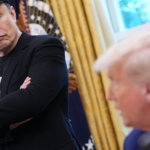President Donald Trump’s tariff dodging fears are actualizing–and it could be costing the administration huge chunks of change.
Goldman Sachs warned that export data indicates increased rates of transshipments from China to the U.S. through third-party countries—a similar pattern observed during the 2018 trade war. The tariff evasion taking place today could impact more than $200 billion in U.S. imports, costing the U.S. $40 billion in tariff revenue if efforts to curb the sidestepping aren’t mitigated, bank analysts Joseph Briggs and Megan Peters said in a report.
Citing data from the United Nations Comtrade database, Goldman noted a steep increase in exports from Asian countries—particularly Vietnam—to the U.S., coinciding with a similar increase in those countries’ imports from China. While part of the correlation could be due to other countries relying more on Chinese goods as a result of tariffs, the speed of the shift could indicate transshipping, analysts said.
“Indeed, early patterns in trade data suggest some evasion of the recently implemented tariffs,” the note said.
“Further, U.S. imports have been cut by larger amounts than can be plausibly explained by lower production costs, suggesting multinational companies may be avoiding tariffs by lowering reported U.S. import prices,” analysts said.
According to U.S. trade data cited by Goldman Sachs in a January note, the share of Chinese imports to the U.S. fell from 21.5% in 2016 to 13.5% in 2023, indicating a $240 billion reduction in China exports.
But the bank warned that this figure overstates the U.S.’s reduced reliance on Chinese exports because of tariff evasion. Goldman Sachs reported that $30 billion to $50 billion in trade was rerouted in 2023, accounting for nearly 20% of the dip in Chinese exports to the U.S. This transshipment effort only accounts for a fraction of the tariff evasion.
“Underreporting and mislabeling have likely had an even larger impact,” analysts said in the January note.
Due to reporting gaps on levied products, the gap between U.S.-reported China imports and China-reported U.S. exports widened by $150 billion. By Goldman Sachs estimations, the reporting gap was in part caused by $80 billion in tariff evasion. About $40 billion of that reporting discrepancy was due to mislabeling products as goods subject to lower tariffs.









